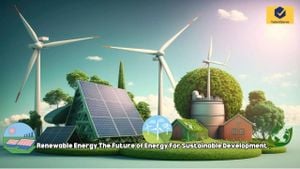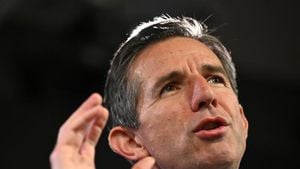Global energy demand is undergoing significant changes, with nuclear power becoming increasingly pivotal as countries strive to meet their growing needs sustainably. The International Energy Agency (IEA) has reported a notable uptick, forecasting power demand to rise by 4% globally this year, the fastest growth since 2007.
This surge is primarily driven by strong electricity needs across multiple regions, particularly China and India. With economic growth tied closely to energy consumption, the race to secure stable, clean energy sources has never been more urgent.
China continues to lead nuclear power expansion, aiming to increase its nuclear generation capacity to combat air pollution and achieve its net-zero emissions targets. This ambitious initiative is mirrored by India's rapidly burgeoning electricity needs, expected to increase by 8% this year, prompting significant investments to bolster its power generation capabilities.
India has primarily relied on coal, but the government is now pivoting toward nuclear energy as part of its broader environmental strategy. The IEA projects coal-fired generation to rise by 7% this year, emphasizing the transitional challenges many nations face as they juggle energy security with climate commitments.
South Africa's recent stance on nuclear energy reflects the delicate balance governments must strike. Despite initial plans to expand nuclear capacity, the government's decision to delay procurement processes illustrates the complicated political and public opinion landscapes surrounding nuclear power.
Electricity from nuclear plants is increasingly viewed as necessary to meet rising demand, especially as countries are motivated by both geo-political and environmental factors. Koeberg, South Africa's only operational nuclear facility, recently received a 20-year life extension, showcasing the critical role existing plants will play moving forward.
Meanwhile, uranium demand, the key fuel for nuclear reactors, has seen upward price pressure since 2016, with current prices reflecting heightened interest from energy sectors worldwide. A bull market is anticipated for uranium as nations turn to nuclear solutions to mitigate reliance on fossil fuels amid global climate initiatives.
International suppliers like Kazakhstan dominate uranium output, accounting for nearly 40% of the global supply. This concentration of resources might impact price stability and availability as countries ramp up their nuclear programs.
Developments, such as the impending construction of new reactors, indicate global recognition of nuclear power’s importance as part of the clean energy mix. Nations establish multi-faceted energy strategies, integrating renewables, coal, and nuclear to create resilient energy infrastructures.
Recent geopolitical tensions have also infused urgency and complexity to these energy discussions. Countries are now aware of their vulnerabilities due to excessive dependence on imported fossil fuels and are actively seeking long-term energy security through diverse sources.
The evolving energy demands, climate commitments, and geopolitical landscapes indicate nuclear energy's critical role. The focus must shift toward maximizing the efficiency of existing nuclear infrastructures and responsibly pursuing new developments.
More nations are now embracing nuclear power, viewing it as integral to securing energy independence and combating climate change. This paradigm shift highlights the urgent need to balance energy demands and environmental sustainability through innovative approaches.
Companies are exploring advanced nuclear technologies, including small modular reactors (SMRs) which promise enhanced safety and flexibility compared to traditional reactors. This innovation could ease public apprehensions surrounding nuclear energy and bolster acceptance as nations transition away from polluting energy sources.
The ramifications of the nuclear renaissance are poised to ripple through the global energy markets, shifting paradigms and influencing future energy policies. While hints of optimism abound, obligations toward public safety and environmental stewardship must remain at the forefront of this evolution.
The future of nuclear energy is also tied to the public perception of safety. Historical events often cast long shadows, and countries must address concerns transparently to galvanize public support for nuclear initiatives.
Energy experts assert education campaigns can help bridge gaps between scientific communities and general populations. Improved awareness could dispel myths and establish trust as nations actively pursue nuclear strategies.
Countries eyeing nuclear power will also need to develop effective waste management strategies. These efforts are pivotal, ensuring the sustainability and long-term viability of nuclear power as part of the global energy mix.
Looking forward, the integration of nuclear power as part of diversified energy portfolios will become more pronounced, helping meet global energy requirements. Government policies and international collaborations will play critical roles as the world navigates this new energy frontier.
With clear benefits for energy security and climate commitments, support networks must be strengthened for the nuclear industry. The cooperation between governmental bodies and the private sector can propel nuclear energy forward, maximizing its potential and shaping a sustainable energy future.
The transition to nuclear energy is not merely about supply; it’s about establishing collaborations. Research and development partnerships between countries and companies can stimulate innovation and insight needed for responsible nuclear expansion.
The next steps for nuclear energy will require re-evaluations of existing infrastructure and investments. Countries will need to ascertain how best to integrate nuclear power with renewable technologies, ensuring coherence and stability across their energy sectors.
Future international agreements may also be pivotal for standardizing nuclear operations and research. Solidifying these policies can lay the groundwork for practical and safe nuclear energy practices worldwide.
Alluding to the strong need for nuclear energy as part of broader energy strategies signifies acknowledgment of its viability moving forward. Continued advancements and appropriate implementations will require unyielding commitment from policymakers, industry leaders, and the public.
With energy demands surging, nuclear power's role is undeniable, signaling transformations on the horizon. The collaborative spirit between nations will likely be the cornerstone of this evolution, ensuring sustainable solutions are both feasible and widely accepted.



